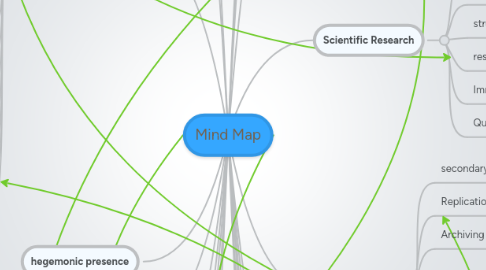Mind Map
作者:BU DistEd


1. Case Studies
1.1. Natural Case Study
1.2. Instrumental Case Study
1.3. Intrinsic Case Study
1.4. Descriptive Case Study
1.5. Explanatory Case Study
2. Care
2.1. Ethics
3. Qualitative Research
3.1. Data Collection
3.1.1. Social interactions
3.1.2. field notes
3.1.3. documents
3.1.3.1. descriptive
3.1.4. artifacts
3.1.5. transcriptions
3.1.6. video clips
3.1.7. Pictures
3.2. Methodology
3.3. credibility
3.4. interviews
3.5. personal observations
3.6. verification
3.7. documentation
3.7.1. account of practice
3.8. theoretical interpretations
3.9. Validity
3.9.1. truth
3.10. claims
3.11. Case Studies
3.12. Replication
4. hegemonic presence
5. Qualitative Inquiry
5.1. Quality
5.2. Commonalities in Practice
6. Standards of Evidence
6.1. Descriptive work
6.2. Prescriptive work
6.3. immersion
7. Heterogeneity of Research
7.1. Multi-method approach
8. Generalization
8.1. Inferential
8.1.1. representational generalization
8.2. Theoretical
9. Discussion
9.1. Validity
9.1.1. Credibility
9.1.2. Relevance
9.1.3. trustworthiness
9.1.4. Triangulation
9.1.5. Attended to at all times
9.2. Commonalities
9.2.1. Account of Practice
10. Claims & Interpretation
10.1. Grounded in evidence and theory
11. standard of ethics
12. Inherently hindered by current academic structures (tenure, credit etc.)
13. Based on Observations
14. Both
14.1. Quality of Work
14.2. Data and Evidence
14.3. Variety
14.4. interdisciplinary links
14.5. Observations
14.6. accountability of data
14.7. Credibility
14.8. Validity
14.9. Peer Review
14.9.1. philanthropic foundations
14.10. Structured Abstracts
15. Scientific Research
15.1. Specialized skill focus
15.2. Limitations
15.3. structured abstracts
15.4. research journals
15.5. Immersion
15.6. Quantitative
15.6.1. Numerical data
16. Data sharing
16.1. secondary analyses
16.2. Replication
16.3. Archiving
16.3.1. Data repositories
16.3.1.1. infrastructure for education research
16.3.1.1.1. AERA
16.4. Ethical Standards for Data Sharing
16.4.1. APA
16.4.2. AAA
16.4.3. ASA
16.5. Accountable, transparent, scholarly communication
16.6. Reliability
17. High Quality Scholarship
18. Educational Practice
18.1. Carnegie Initiative on the Doctorate
19. Knowledge accumulation
20. Replications
20.1. Establish generalizability
21. Federal Agency Support
21.1. FERPA 1974
21.2. IRB
21.2.1. protect the rights of research participants
